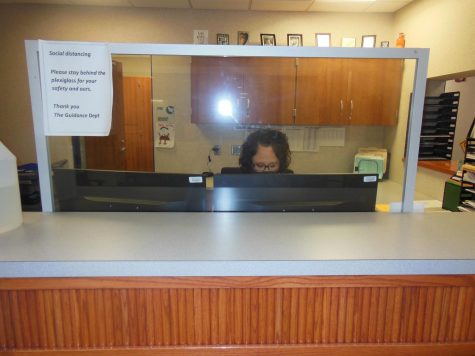Guidance seeks to help students, staff
Corrected

Maintaining good mental health is a struggle for many people, and the students and teachers at Carroll are no exception. Many students and teachers feel their mental health isn’t the best, or could be better. Out of the 24 people interviewed, only 3 of them said their mental health was decent.
Teacher Tyler Adelsperger was one of the few who felt that overall, their mental health was good. “On a day-to-day basis, I feel my mental health is good,” said Adelsperger. “Of course, with everything over the last year and a half, some days it is very easy to get overwhelmed and stressed.”
On the flip side, some students feel their mental health is bad overall. Freshman Elijah Ekanem was one of the many who talked about this.
“I would say that I’m not doing well. It is a lot harder to remain positive all the time because I always feel so upset with myself even if I had a good day,” said Ekanem.
Ekanem also elaborated on this statement. “People making fun of me for things that I can’t control really hurts and nothing has gotten better in the years since its happened. I base my opinion of myself off of others, and I know I shouldn’t, but I do unfortunately.”
Bullying, unneeded comparisons, and other things can lead to stress, which leads to bad mental health. One of those other things is school, which is by far the biggest stressor for students. Problems like homework, having to make up multiple tests, and trying to keep up with the work assigned were the biggest issues.
Sophomore Nicholas Guinn was one of the students that felt this stress.
“Returning to school and keeping up while I was quarantined definitely stressed me out,” said Guinn. “I’d say leniency on assignment due dates would help to alleviate this pressure. Teachers working with the students to decide an appropriate amount of time would also help.”
Falling behind on schoolwork can lead to bad grades, which then leads to more stress. With the number of students who were quarantined before the mask mandate took effect, a mass wave of late work and declining grades contributed to many students’ mental health.
To combat this stress, guidance counselors are available to help with mental health in students. However, multiple students felt that the guidance counselors should change their approach in order to help more students.
“Actually having teachers and counselors reaching out to the students, specifically the students with mental health problems would be nice. At the moment the only way to get help with your mental health in school is to go directly to the counselors and even then they may not have the schedule, nor the tools to help you,” said sophomore Marie Brammer. “Not many kids are willing to reach out to the counselors. Moves should be made to make mental health help more reachable and to teach us more about mental health in the classrooms.”
Senior Dominic Cardenas elaborated more on what guidance can do to help students.
“Counselors should do more outreach, like having mental health presentations in homeroom or having more emphasis on mental health in health classes. Also, train teachers on mental health so they can create a better learning environment and recognize students who may be struggling with it,” said Cardenas.
At the moment, not many teachers are trained in mental health. Teacher Tyler Adelsperger is one of those teachers, and commented on this fact.
“I think our schools do a pretty great job when it comes to mental health, but I often hear students say that they don’t know who to talk to when things get difficult. Our guidance and SAP counselors are fantastic, but oftentimes students come to the teachers with their difficulties, and teachers aren’t always trained in handling those heavy emotions effectively,” said Adelsperger.
Another senior, Sean Fuller, had a different suggestion. “I think the school could give an announcement about mental health issues impacting students, that way students can help a person they know that does have a mental health issue, as the school doesn’t mention mental health issues a lot. It could just help raise awareness.”
Teachers like Kyan Yauchler, an English teacher, had similar views, and commented on the stigma that prevents many students from reaching out for help.
“We have some good resources in place, but I think it’s always a good idea to engage more with students as to how common mental health struggles are and how many options there are out there for dealing with them,” said Yauchler. “These things can help rid our society of the stigma of mental health issues.”
The school does have other measures in place to help students manage and relieve their stress, like activity periods on Wednesdays, which Freshmen Center Biology teacher Michelle Brenner commented on.
“I think activity period is a nice way to allow students to have some down time at school. However, it has been quite a few years since I was a teenager, and even though I like to think I know what teens are facing, I really don’t fully understand the pressures faced by students,” said Brenner. “I think asking students how we can help them is good too!”
Students aren’t the only ones dealing with mental health issues. Tyler Adelsperger talked about his struggles, and how it affects him.
“I am very open about my ongoing experiences with anxiety, depression, and panic disorder. These are things that I deal with on a daily basis, and they definitely play a role in who I am as a teacher and a person. They make me more aware of my surroundings and my feelings, but they also make me more empathetic to my students’ emotions,” said Adelsperger.
Mental disorders often interfere with daily life, such as during school, home life, and other instances. It’s important to note that teachers, the guidance office, and even talking to other students can help combat some of the stress and negative effects of mental disorders.
Adelsperger offers advice to students and teachers about dealing with their emotional struggles.
“One of my favorite podcasters says, ‘Your mental illness is not your fault, but it is your responsibility,'” Adelsperger said. “And that is something I take to heart.”
CORRECTION: In the original published story, The Charger Online incorrectly attributed words said by Mr. Adelsperger to another teacher. The current version is correct.

Hi, my name is Jack, and I'm a senior. I'm a writer on the Charger Online, a songwriter, and a person who's too fruity for homophobes to handle. I'm also...












